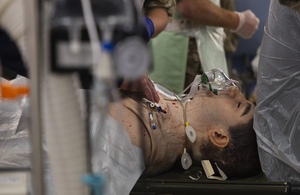World-leading surgical mannequin used to train military surgeons on immersive exercise for first time
A cutting-edge trauma casualty simulation mannequin, invented and developed by a UK clinician and funded by the Ministry of Defence, has been used for the first time in a full-scale field hospital training exercise.

Realistic training mannequin invented by Professor Pallister being operated on.
Invented and developed by civilian orthopaedic major trauma surgeon Professor Ian Pallister, the Surgical Advanced Mannequin (SAM model) is a world-leading training simulation model which can be inserted with different injury patterns such as blast wounds and gunshots. It can also ‘breathe’ and be pumped with ‘blood’ to simulate bleeding.
The innovative mannequin, refined over a ten-year development period, has enabled Armed Forces medical teams to participate in a highly realistic level of training on a clinical exercise run by the Army Medical Services Training Centre (AMSTC).
Earlier versions of the SAM model have also been used to train Ukrainian military surgeons.
Minister for Defence People, Veterans and Service Families, Dr Andrew Murrison, who is a doctor in the Reserves, said:
These world-class training models are an excellent demonstration of the type of innovative equipment produced by UK defence and our industry partners. They play a vital part in delivering cutting-edge training to both our Ukrainian allies and our exemplary military medical and surgical teams in the UK, helping to ensure they continue to be the very best at what they do.
Professor Pallister developed the SAM model using CT scans and 3D-printed masters of specific wounds such as a gunshot or pelvic injury. His latest version of the model can be intubated, have dead ‘tissue’ removed, and be used for exploratory surgery.
Professor Ian Pallister said:
SAM models, which have been taken on board Royal Navy ships and deployed in land environments, are the product of years of constant redesign and redevelopment and these evolving innovations would not have been possible without the close cooperation of Defence Medical Service colleagues and the Defence Science and Technology Laboratory.
Clinical Adviser for Deployed Hospital Care, Army Medical Services Training, Colonel Jonny Round said:
Traditionally at AMSTC, we’ve used a live casualty actor with some make-up to deliver a list of symptoms and injuries. Professor Pallister’s model simulates, very realistically, combat wounds requiring surgical intervention.
The surgeons get to operate, and the entire team train, in a field hospital that replicates the one they will find themselves deployed to. We are immensely proud that through this training we can deliver world-class medical teams to operations.